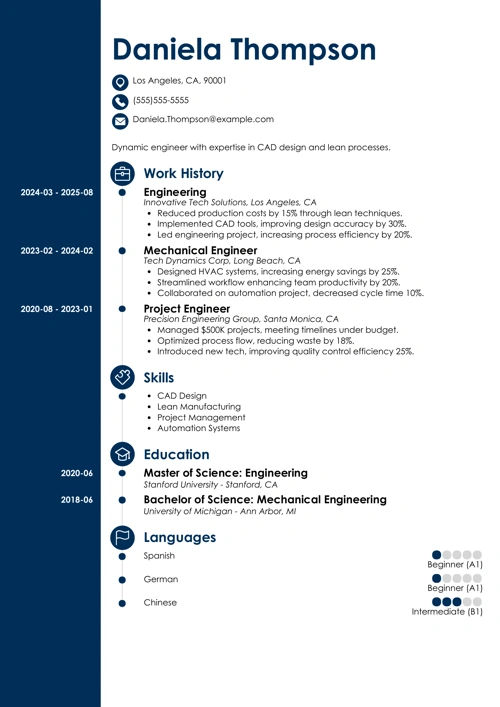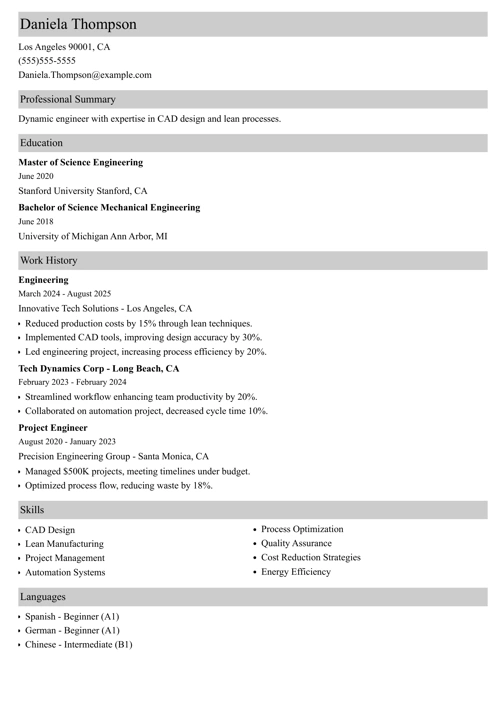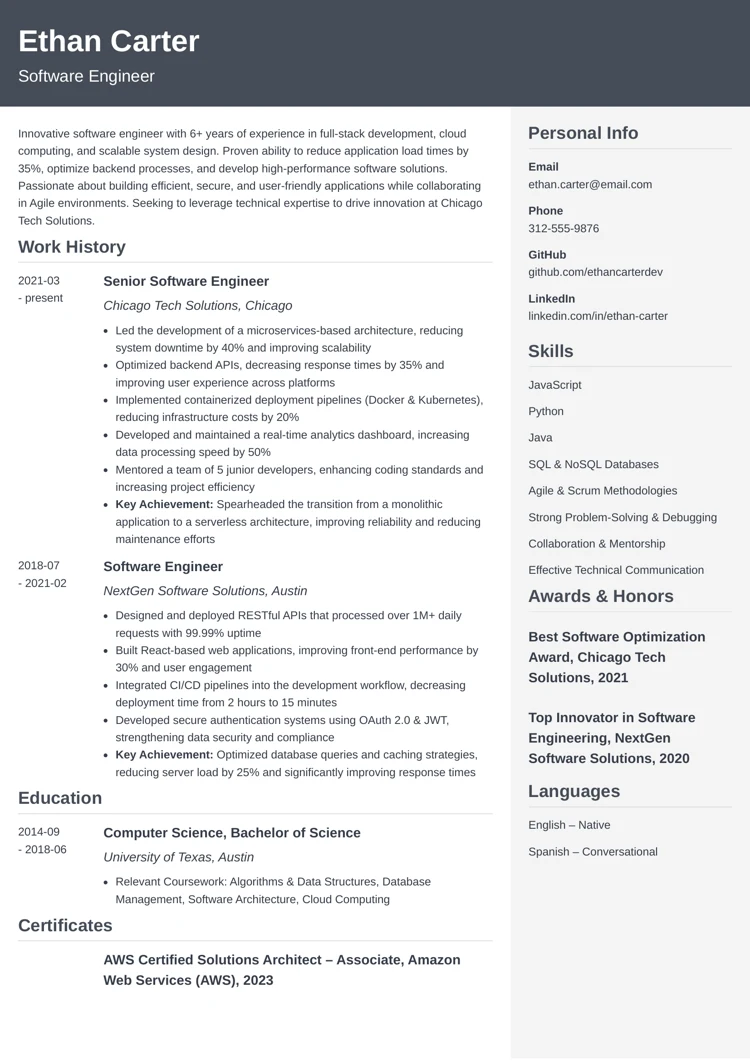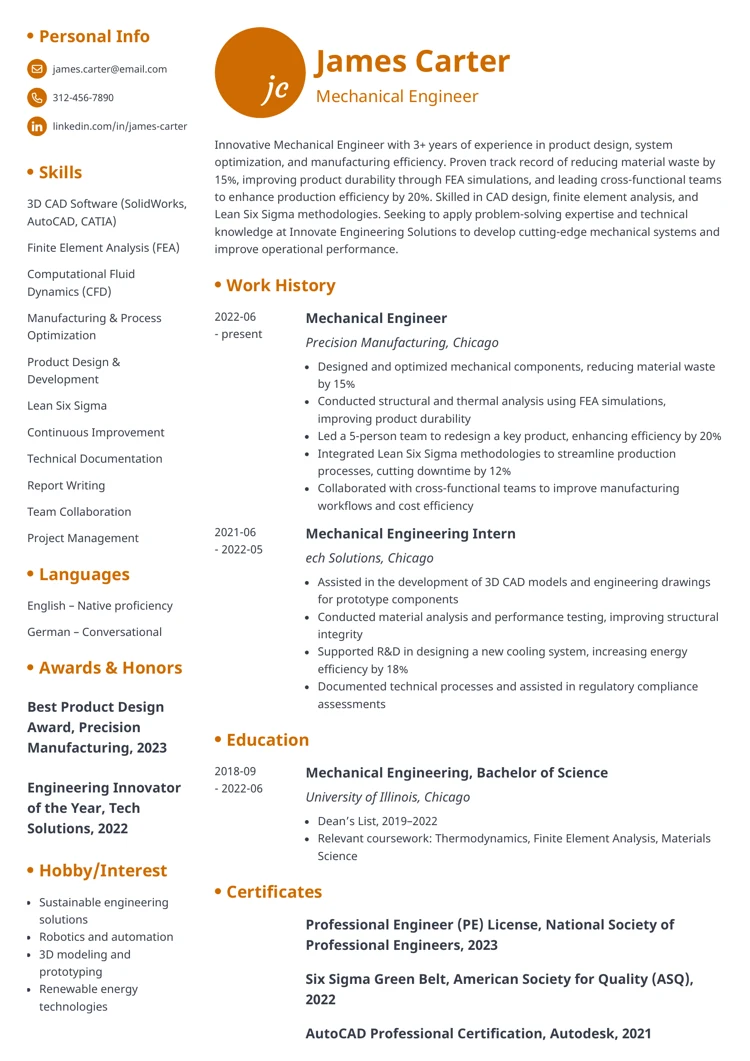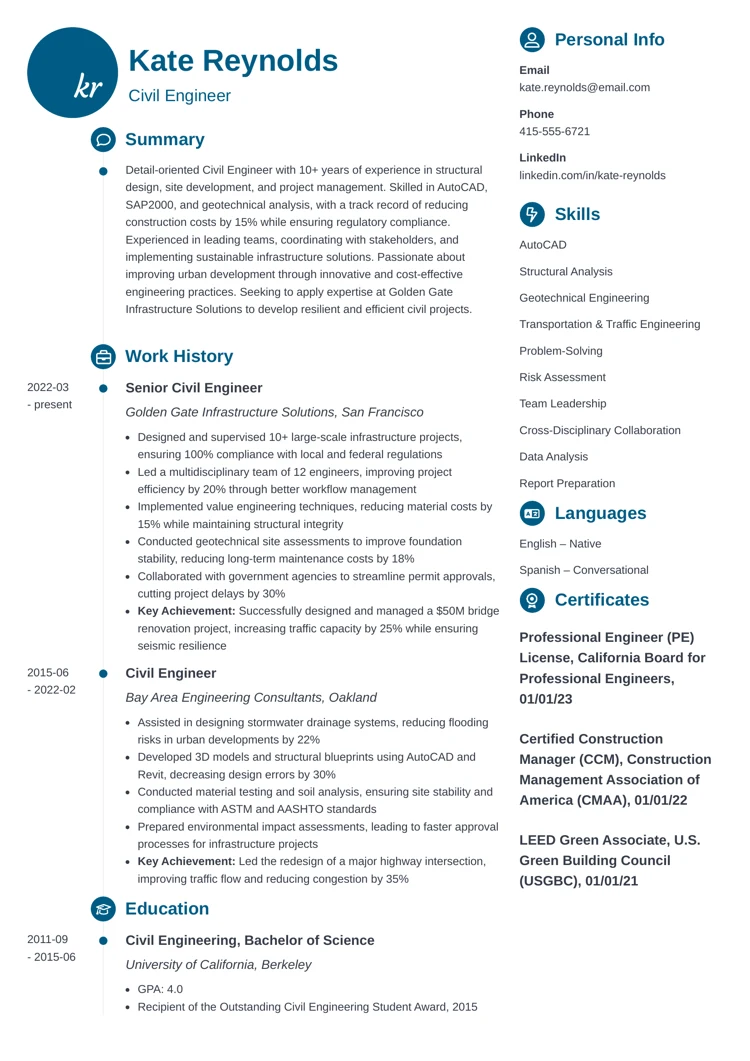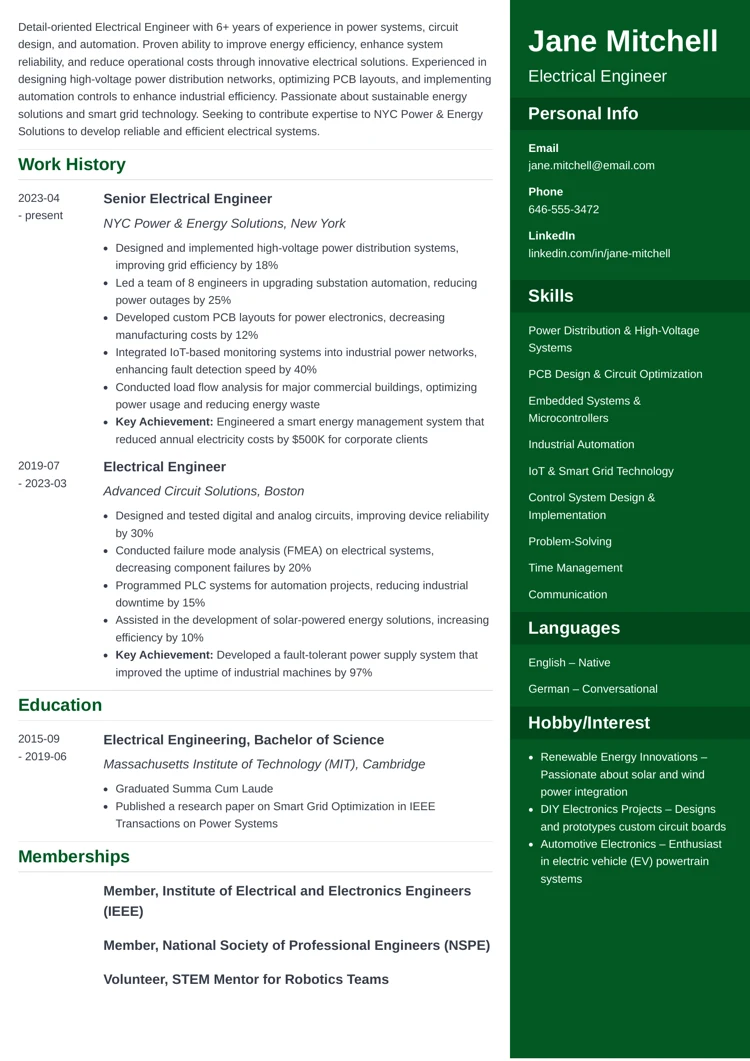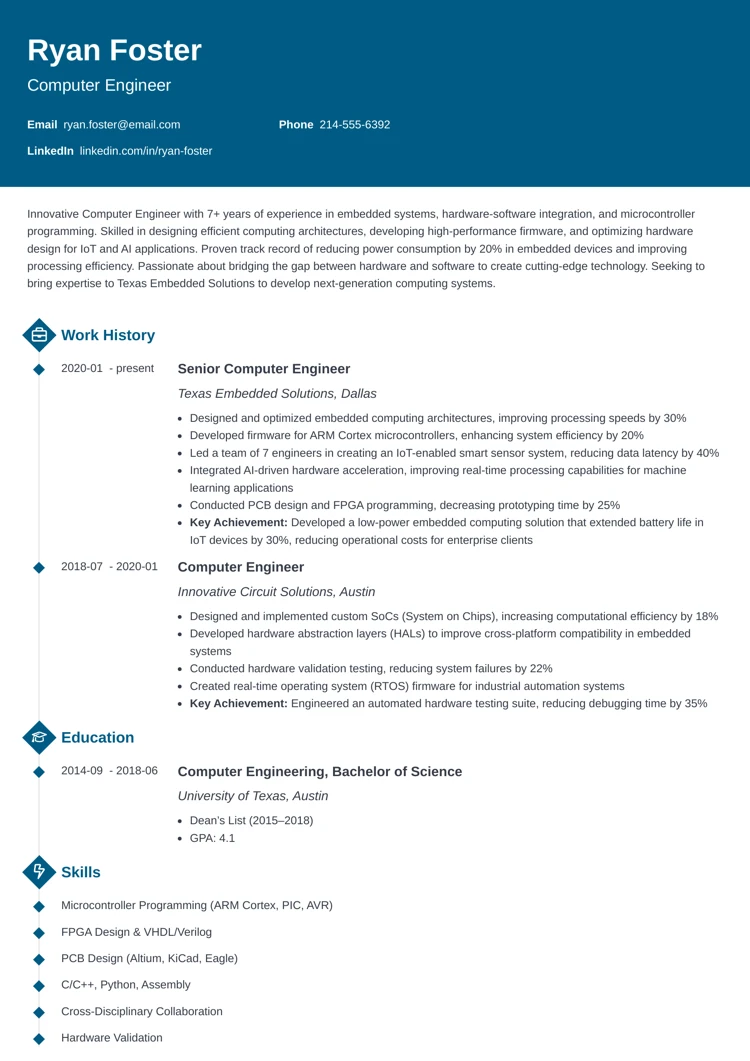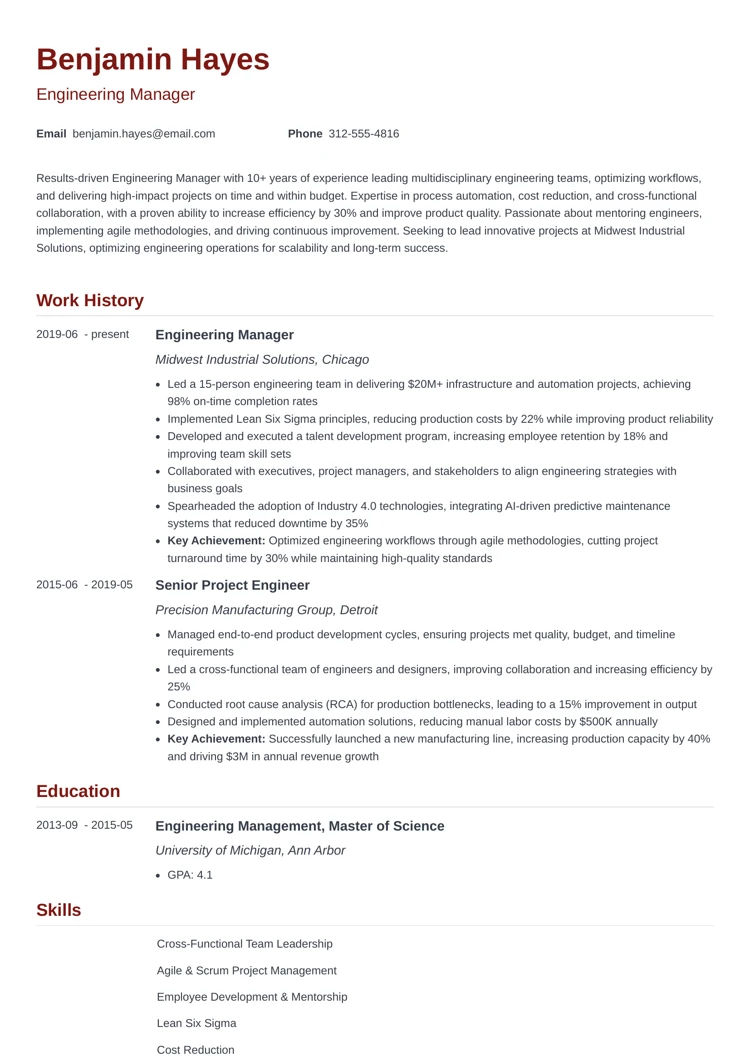You’ve got the technical expertise, the problem-solving skills, and the engineering mindset to tackle complex challenges. But to land the job, you need an engineering resume format that showcases your achievements effectively.
Wondering how to build a resume that highlights your skills and experience the right way? Use my expert-backed engineering resume examples and templates to craft a polished, professional document that gets you noticed!
Top Article Insights:
- Engineering resume example & template to copy & paste.
- Resume examples for mechanical engineers, civil engineers, software engineers, and more!
- Step-by-step guide on how to write an engineering resume.
Engineering Resume Example
Create Your Engineering Resume Now
Engineering Resume Template to Copy & Paste (Text Version)
Daniela Thompson
Mechanical Engineer
808-555-6789
daniela.thompson@email.com
linkedin.com/in/daniela-thompson
Summary
Results-driven mechanical engineer with 5+ years of experience in product design, manufacturing optimization, and process automation. Proven ability to reduce production costs by 18%, improve system efficiencies, and lead cross-functional teams to drive innovation. Seeking to bring problem-solving skills and technical knowledge to Hawaii Tech Solutions to develop cutting-edge mechanical solutions.
Experience
Mechanical Engineer
Pacific Manufacturing Corp., Honolulu, HI
March 2023–Present
- Designed and optimized 5+ high-precision mechanical components, reducing material waste by 12% while maintaining structural integrity.
- Spearheaded an automation initiative that cut down assembly time by 30%, saving over $250K annually in labor costs.
- Led a 6-member engineering team in redesigning a key product line, increasing production efficiency by 22%.
- Developed and implemented finite element analysis (FEA) simulations, reducing prototype failures by 40%.
- Collaborated with cross-functional teams to integrate Lean Six Sigma practices, eliminating 17% of process inefficiencies.
Key Achievement:
- Reduced overall manufacturing defects by 25% through root cause analysis (RCA) and process refinements.
Design Engineer
Island Tech Solutions, Hilo, HI
June 2020–February 2023
- Developed 3D CAD models and engineering drawings for prototype components, accelerating design validation by 20%.
- Conducted material analysis and stress testing, improving durability by 15% in key mechanical assemblies.
- Implemented cost-saving design modifications, reducing production expenses by $180K annually.
- Collaborated with the R&D team to introduce 2 new product designs, which generated an 8% increase in sales.
- Standardized technical documentation and design protocols, leading to 30% fewer design iteration cycles.
Key Achievement:
- Optimized a high-performance cooling system, enhancing efficiency by 23% and securing a patent for the design.
Education
Bachelor of Science in Mechanical Engineering
University of Hawaii, Hilo, HI
September 2015–June 2019
- Recipient of the Outstanding Engineering Student Award, 2015
- Published research on additive manufacturing advancements in Hawaii Engineering Journal
Skills
- CAD Software (SolidWorks, AutoCAD, CATIA)
- Product Development & Prototyping
- Finite Element Analysis (FEA)
- Computational Fluid Dynamics (CFD)
- Problem Solving & Troubleshooting
- Team Collaboration
- Decision-Making
- Communication
Certifications
- Professional Engineer (PE) License – National Society of Professional Engineers (NSPE), 2024
- Certified Manufacturing Engineer (CMfgE) – Society of Manufacturing Engineers (SME), 2022
- Six Sigma Green Belt – American Society for Quality (ASQ), 2022
- AutoCAD Professional Certification – Autodesk, 2021
Awards & Honors
- Engineering Innovator of the Year, Pacific Manufacturing Corp., 2022
- Best Product Design Award, Island Tech Solutions, 2021
Memberships
- Member, American Society of Mechanical Engineers (ASME)
- Member, Society of Automotive Engineers (SAE)
Software Engineering Resume Example
What Makes This Example Stand Out? (Expert Tips)
Cubic by Zety is one of our greatest resume templates. What I love about it most is how vividly it represents your unique set of skills. Adding a bar that shows your proficiency is a great idea that catches the recruiter’s eye. And that’s something super valuable.
Find out more about: Software Engineering Resume Template
Mechanical Engineering Resume Example
What Makes This Example Stand Out? (Expert Tips)
Initials is a resume template that makes your name stand out, and not only by bolding your surname. Do you see the circle with your initials? What a cool way to create a sort of logotype for your candidacy. Hard to skip, harder to forget!
Find out more about: Mechanical Engineer Resume Template
Civil Engineering Resume Example
What Makes This Example Stand Out? (Expert Tips)
Primo is one of our creative resume templates, and it proves you can stand out without being too flashy. Notice the timeline format for your education and experience sections, which really helps you present your career path in a readable way. This makes the recruiter’s job much more manageable, which is always a plus!
Find out more about: Civil Engineering Resume Template
Electrical Engineering Resume Example
What Makes This Example Stand Out? (Expert Tips)
Enfold is our two-column resume, which helps you stand out due to its unusual layout. Unlike what you expect from a resume, its header is on the right-hand side. Catches the eye and presents the information in a clear way. What else can you expect from a good resume template?
Find out more about: Electrical Engineering Resume
Computer Engineering Resume Example
What Makes This Example Stand Out? (Expert Tips)
This resume template, called Diamond, replaces classic bullet points with diamonds. Pretty bold, right? But notice how well-structured all the pieces of information are. Plus, with a header that mighty, your resume can’t go unnoticed.
Find out more about: Computer Engineering Resume
Engineering Manager Resume Example
What Do I Think About This Example? (Expert Tips)
Nanica is one of our simple resume templates, making it ideal for highly experienced engineers with numerous achievements to showcase. Its sleek design ensures your accomplishments remain readable and impactful while maintaining the correct resume length.
Find out more about: Engineering Manager Resume
Looking for a more specific engineering position? Check these out:
- Chemical Engineering Resume
- Industrial Engineer Resume
- Manufacturing Engineer Resume
- Network Engineering Resume
- System Engineering Resume
- Quality Engineering Resume
- Project Engineer Resume
- Engineering Student Resume
- Engineering Internship Resume
- Entry-Level Mechanical Engineer Resume
Creating a resume with our builder is incredibly simple. Follow our step-by-step guide and use content from Certified Professional Resume Writers to have a resume ready in minutes.
When you’re done, Zety’s resume builder will score your resume and our resume checker will tell you exactly how to make it better.
How to Write an Engineering Resume?
We’ve done the examples; now it’s time for a quick how-to guide. After this, you’ll know everything about engineering a great engineering resume!
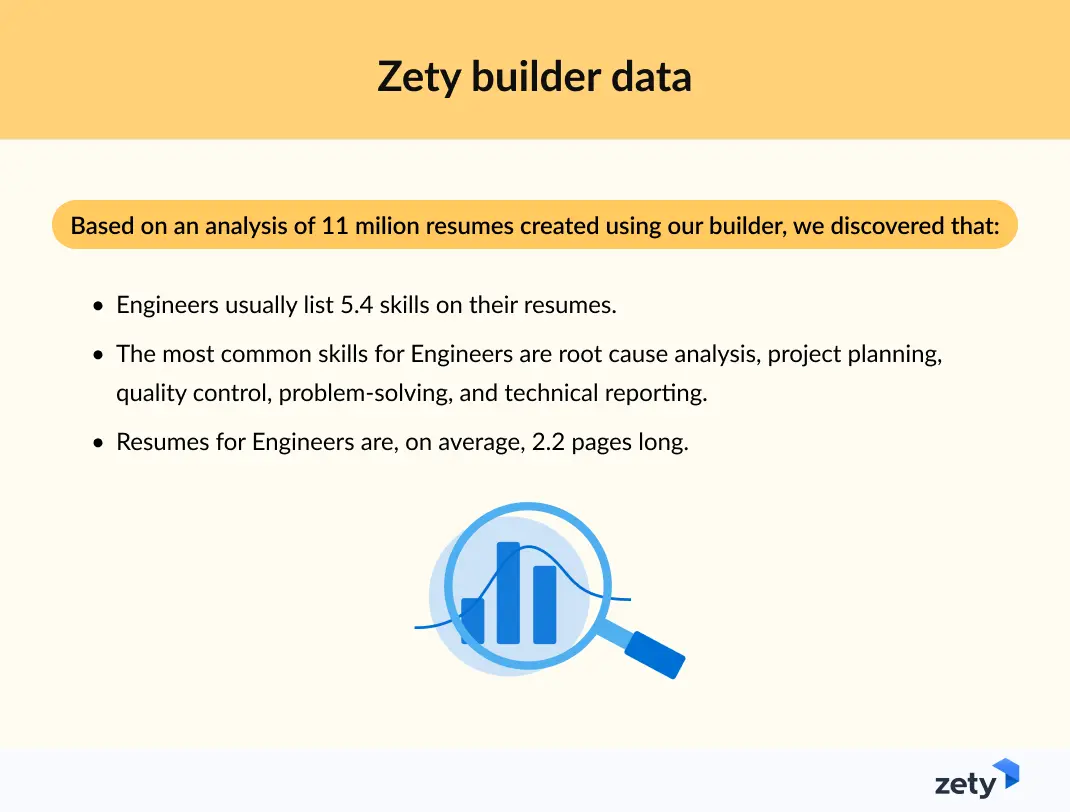
1. Format Your Engineering Resume Right
As an engineer, you know the importance of the correct structure. Whether it’s your blueprints, code, or system architecture, a strong foundation is key to stability, efficiency, and success. The same applies to your resume.
Here’s how to organize your resume for an engineer:
- Structure your document using the following resume parts:
- Resume Header (including contact information, such as your phone number, email address, and LinkedIn profile address)
- Summary Statement or Career Objective
- Work History
- Education
- Skills
- Additional Sections
- Choose a professional resume font with a size of 11–12 points.
- Apply one-inch resume margins on each side of your document.
- Set the line spacing to 1.5 points.
- Save your file as a PDF resume format to keep its format intact.
- Name your resume the right way, using your full name, job title and the word “resume.”
Pro Tip: Stick to the correct resume length. Try to aim for one page. However, if you’ve got years of relevant experience and many great achievements to impress your recruiters with, create a two-page resume.
2. Add Relevant Experience to Your Engineering Resume
Just as a well-structured design improves the readability of your resume, the right experience makes it clear, precise, and job-ready. But speaking only about your past duties won’t impress the recruiter.
Here’s how to show your work history on an engineering resume:
- Follow the reverse chronological format, which recruiters prefer most and open with your current job title. Include the companies’ names and dates of your employment.
- Focus on your impressive accomplishments and not only on your duties.
- List them in up to 6 bullet points, starting each one with an action verb.
- Quantify your achievements to show recruiters you understand the impact of your work.
- Add a “Key achievement” at the end of each entry to highlight your most impressive success even more.
Mechanical Engineer
Pacific Manufacturing Corp., Honolulu, HI
March 2023–Present
- Designed and optimized 5+ high-precision mechanical components, reducing material waste by 12% while maintaining structural integrity.
- Spearheaded an automation initiative that cut down assembly time by 30%, saving over $250K annually in labor costs.
- Led a 6-member engineering team in redesigning a key product line, increasing production efficiency by 22%.
- Developed and implemented finite element analysis (FEA) simulations, reducing prototype failures by 40%.
- Collaborated with cross-functional teams to integrate Lean Six Sigma practices, eliminating 17% of process inefficiencies.
Key Achievement:
- Reduced overall manufacturing defects by 25% through root cause analysis (RCA) and process refinements.
Pro Tip: Use the job title from the job ad to improve your chances of passing the Applicant Tracking Systems (ATS) and reaching your recruiter’s desk.
3. Make Your Education Section Count
Your education is more than just a degree—it showcases your expertise and specialization. While a bachelor’s is the most common degree awarded to students studying engineering, adding more details to your education, such as advanced degrees, associate degrees, and certifications, can truly set you apart.
Here’s what to include in the education section:
- Degree Earned
- University Name
- Graduation Year
- Relevant coursework (if you’re an entry-level engineer)
- Extracurricular Activities
- Honors and Distinctions (magna cum laude, Dean’s List, etc.)
Education
Bachelor of Science in Mechanical Engineering
University of Hawaii, Hilo, HI
September 2015–June 2019
- Recipient of the Outstanding Engineering Student Award, 2015
- Published research on additive manufacturing advancements in Hawaii Engineering Journal
Pro Tip: Should you include GPA on a resume? Do it only if it’s equal to or higher than 3.5.
4. Highlight the Right Skills on Your Engineering Resume
In your field of work, there are about 195,000 openings projected each year. To stand out among your competitors, your resume should highlight both hard and soft skills that match the job.
Here are the key skills to consider:
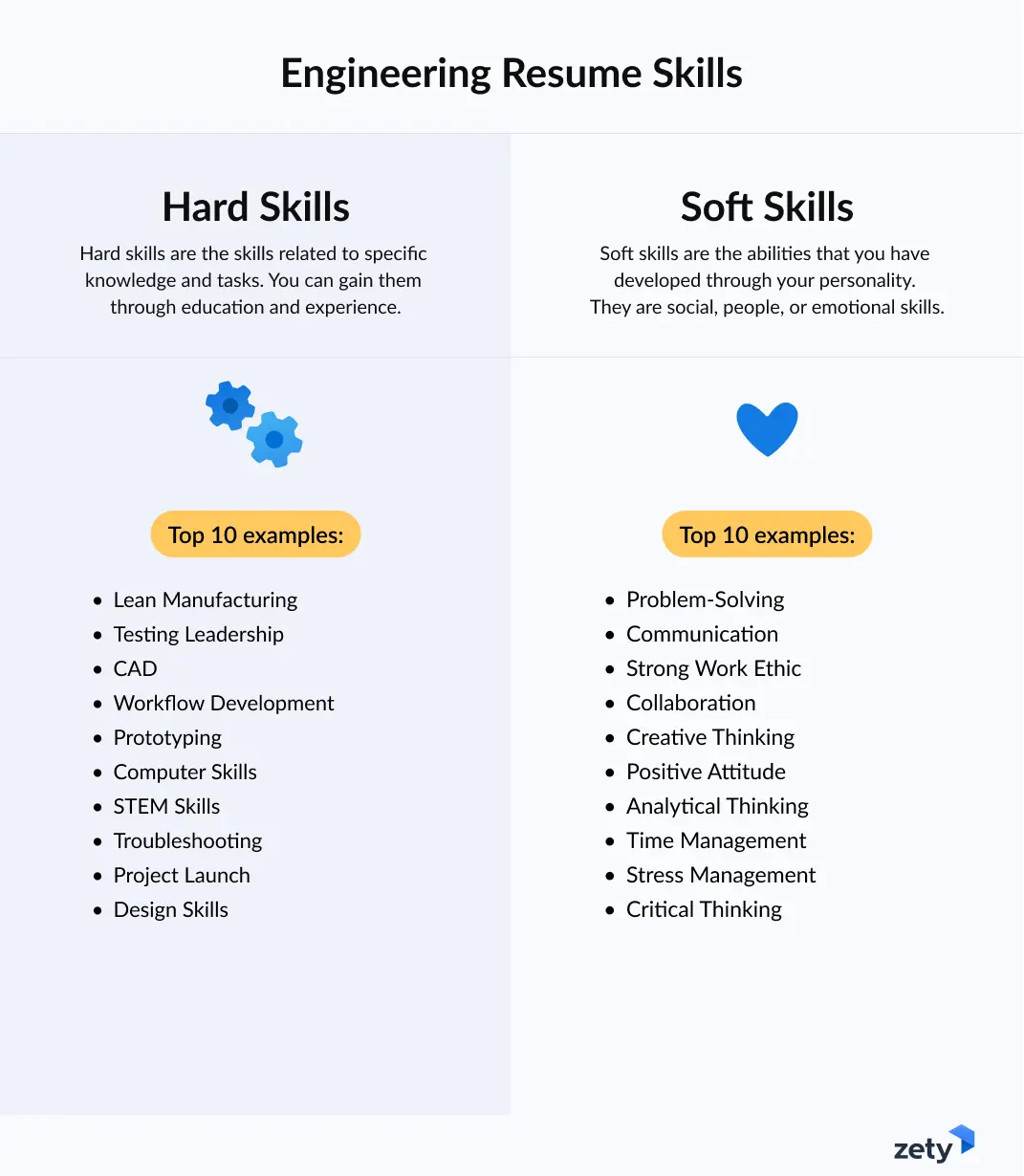
Want to learn more about what skills are in demand? Read our guide: Top Employability Skills for Your Resume.
5. Add Extra Sections to Your Engineering Resume
The sections I described above are a must-have for every resume. But you want a resume that stands out. How can you achieve this? By adding some extra information to your document when applying.
Certifications & Licenses
- Professional Engineer (PE) License – National Society of Professional Engineers (NSPE) / State Licensing Board, 2024
- Certified Manufacturing Engineer (CMfgE) – Society of Manufacturing Engineers (SME), 2023
- Six Sigma Certification (Green Belt, Black Belt) – American Society for Quality (ASQ) / International Association for Six Sigma Certification (IASSC), 2022
- AutoCAD Professional Certification – Autodesk, 2021
Projects & Extracurricular Activities
- Lead Engineer for a university robotics competition team
- Member of the local IEEE chapter
Volunteer Experience
- Mentor for FIRST Robotics Competition teams
- Engineering tutor for underprivileged students
- Volunteer at local science and technology fairs
Publications and Articles
- "Advancements in Sustainable Manufacturing" – Published in Journal of Mechanical Engineering, March 2023
- Co-authored research on AI in structural analysis – IEEE Transactions on Engineering
Memberships
- Institute of Electrical and Electronics Engineers (IEEE)
- American Society of Mechanical Engineers (ASME)
- Society of Women Engineers (SWE)
Awards & Honors
- Recipient of the ASME Best Innovation Award (2023)
- Named “Emerging Engineer of the Year” by the State Engineering Association (2022)
Language Skills
- English (Native)
- German (Intermediate)
Professional Development
- Attended ASME International Mechanical Engineering Congress & Exposition (2023)
- Completed Lean Manufacturing Workshop
- Published research in an engineering journal
A strong resume isn’t just about listing your work experience—it’s about telling your professional story. Adding sections like certifications, volunteer experience, publications, and memberships helps showcase your personality, work ethic, and dedication to continuous learning. These extra details provide deeper insight into your expertise and unique strengths, giving employers a clearer picture of what you bring to the table beyond your technical skills.
6. Write a Strong Engineering Resume Summary or Objective
A resume profile is a quick snapshot of your top engineering qualifications. It’s important to ace this part of your resume, since this is the first thing the recruiter will notice.
There are actually two types of resume profiles you can choose from.
- Write a resume objective if you have less than 2 years of relevant experience. This is great for an engineering student resume or an internship resume.
- Write a professional summary if you’ve been working as an engineer for over 2 years.
And there are these two simple formulas to apply:
- Engineering Resume Objective
Adjective(s)/Certificate(s) + Your Current Job Title or Degree + seeking employment as an Engineer at + Company Name + to apply my + Your Relevant Skills + to help + What Do You Want To Help The Company Achieve
- Engineering Resume Summary
Adjective + Engineer + Years of Experience + Achievements + Skills + What You Want to Do for the Employer
Results-driven mechanical engineer with 6+ years of experience in product design, manufacturing optimization, and process automation. Proven ability to reduce production costs by 18%, improve system efficiencies, and lead cross-functional teams to drive innovation. Seeking to bring problem-solving skills and technical knowledge to Hawaii Tech Solutions to develop cutting-edge mechanical solutions.
Pro Tip: Even though your resume profile goes on top of your document, write this section last. It will be easier to create it from all the things you included throughout your resume.
7. Add an Impressive Cover Letter to Your Engineering Resume
A cover letter is a great opportunity to explain further why you’re the top choice a recruiter has. Always add it to your resume because it also shows one more significant quality: you’re ready to make an extra step if it means an extra impact.
Here’s how to write a cover letter:
- Open with a professional cover letter greeting.
- Write a cover letter opening paragraph that will make the reader want to keep on reading. Relevancy is the key!
- Focus on your key skills and most relevant achievements to highlight how you fit the role.
- Close your cover letter by asking for an interview. Seems bold, but works magic.
- End with a professional cover letter sign-off.
Dear Karen,
Leading the team that increased production efficiency by 35% in Raytheon IADC Metal Fab was one of the proudest events of my life. Your opening in engineering at SiniTrode Global is the logical next step.
SiniTrode's commitment to Continuous Improvement is well-known in engineering circles. Here are a few of the ways I feel I fit the job:
- At Raytheon, slashed department costs by 28% and cut lead times 22%
- At BAE, increased employee engagement in the Lean program by 42%
- Cut rework 25%
- Lean/Six Sigma Black Belt
Learn more about creating a job-winning cover letter. Visit my guide: Engineering Cover Letter Template.
Plus, a great cover letter that matches your resume will give you an advantage over other candidates. You can write it in our cover letter builder here. Here's what it may look like:
See more cover letter templates and start writing.
Expert Curated Video Content
In this video, Caio, our Certified Professional Resume Writer explains in detail how to write a software engineering resume in five minutes!
About Zety’s Editorial Process
This article has been reviewed by our editorial team to make sure it follows Zety's editorial guidelines. We’re committed to sharing our expertise and giving you trustworthy career advice tailored to your needs. High-quality content is what brings over 40 million readers to our site every year. But we don't stop there. Our team conducts original research to understand the job market better, and we pride ourselves on being quoted by top universities and prime media outlets from around the world.


